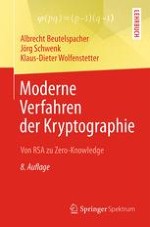2015 | OriginalPaper | Chapter
4. Zero-Knowledge-Verfahren
Authors : Albrecht Beutelspacher, Jörg Schwenk, Klaus-Dieter Wolfenstetter
Published in: Moderne Verfahren der Kryptographie
Publisher: Springer Fachmedien Wiesbaden
Activate our intelligent search to find suitable subject content or patents.
Select sections of text to find matching patents with Artificial Intelligence. powered by
Select sections of text to find additional relevant content using AI-assisted search. powered by
